One Legal is made up of a team of passionate, extremely knowledgeable individuals who put their specific areas of expertise to good use for our customers. Meet the brilliant people behind the scenes to explore why and how we do what we do.
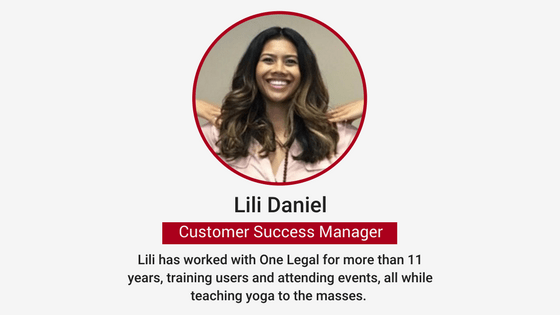
It’s been said before, most recently in a study by Robert Half International, those employed in the legal profession report the greatest amount of stress. And all that stress can become as physical as it is mental, especially when you’re also in an office environment, with all the stressors that includes.
Everything in your body works all together, so if at the end of the day you’re hurting in your neck, you can expect that pain to will travel to your back, to your legs, and arms as well. It’s all connected.
The good news is that, while there are ways to de-stress throughout the workday, you can also begin to alleviate neck pain, increase flexibility, and strengthen your body, all while sitting in your chair:
Neck stretches
If your neck—or any other part of your body—is feeling sore or strained, try out these stretches to strengthen and relax your muscles. Hold each pose for five breaths, and check in with your body in between every stretch.
#1 Looking down and up
Slowly raise your head to look at the ceiling, pause, then drop your head to look at the ground, stretching first the front of your neck, then the back.


#2 Rolls
Roll your head to one shoulder and, with the same-side hand, gently pull your head towards your shoulder.


#3 Shoulder shrugs
Push your shoulders down, away from your ears, then move them to the front and back.


#4 Raise your hands above your head
To straighten your spine and stretch out your alignment, reach your hands up above your head, and hold.
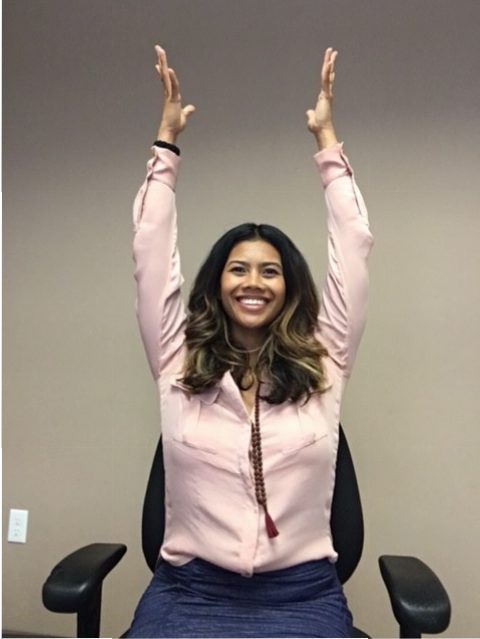
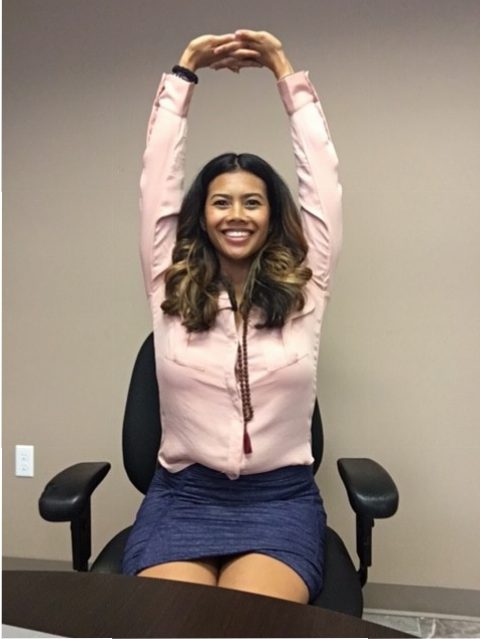
#5 Side stretch
Reach one arm out to the opposite side, pulling it against your other wrist.
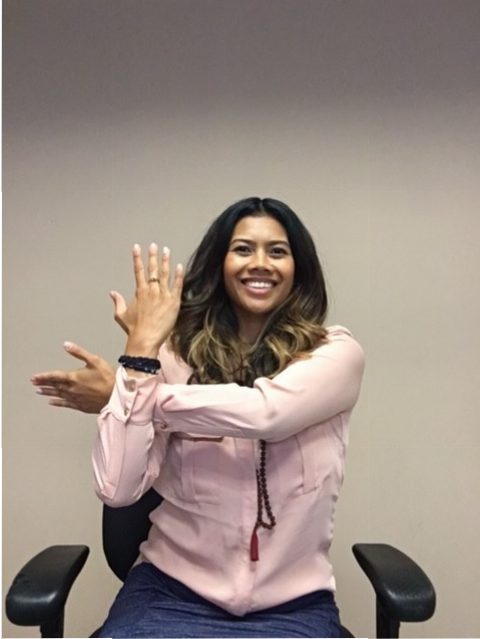
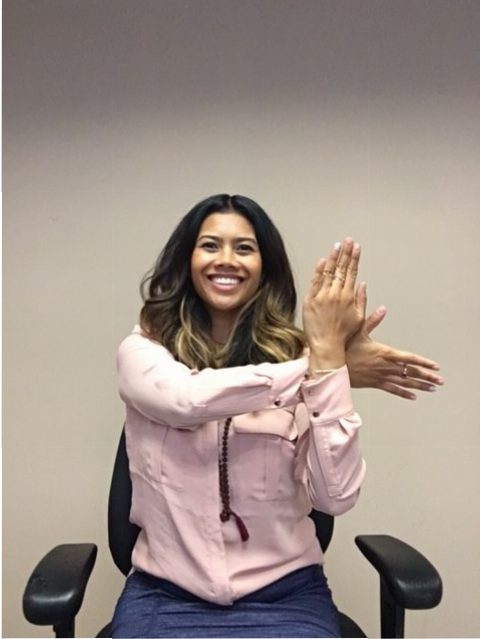
Posture
Most bodily pain originates in your posture, in how your body is meeting the elements around you (the chair, the desk, the floor) and how it is aligned or unaligned with itself. Improving your posture is a huge step towards preventing pain from happening in the first place.
- Sitting – We want our feet to be flat and everything on our body to be stacked, or aligned. Sit straight with your back resting against the back of the chair, feet flat on the floor or a stool.
- Shoulders – Keep your shoulders pushed away from your ears and avoid scrunching them—something that tends to happen when we are stressed.
- Alignment – Everything basically needs to align with your shoulders “stacked”. Lumbar spine should be straight. You’re pretending there’s a wall behind where you put your head: everything is aligned. When you push your shoulders forward etc.
- Core – Engaging your core automatically stacks and lengthens your spine.
- Line of sight – Try to orient your desk so that for most of your day, you are looking at the horizon, straight ahead. Adjust your monitor so that your screen is 18-24 inches away from your eyes, approximately 15 to 30 degrees below your line of sight. Avoid looking down or to the side too frequently or for too long.
- Rest – Try to take regular breaks—away from your desk—to give your eyes a real rest. It’s best to move every 45 minutes to keep your body fluid and to prevent stiff necks or tweaks in your back from getting stuck in one position for too long. Walk around or go outside, and do some of the stretches before returning to your work.
- Switch – If you do find yourself in position where you’re favoring one side over the other, try to balance out that movement. If you are resting your chin in one hand, switch and use the opposite side for a similar amount of time. This helps to balance the movements and even out the wear on your body.
Other factors contributing to neck pain
Flexibility
Flexibility can also help relieve your neck pain by giving you a greater range of movement. The more flexible you are, the more fluidity of movement, that you have the better. If you have a non-flexible neck and you turn to quickly or are jolted too fast, you can get easily injured. Just like when you lock your knees, there’s no give to your legs to catch the impact.
“I’ve been in two car accidents—knock on wood—and have never been hurt,” Lili shared regarding her own experience. “Never had whiplash. Even when someone jackknifed me and totaled my car, my doctor was surprised that I never got hurt. That flexibility and the mobility I have has decreased my susceptibility to injuries.”
Stress-related symptoms
When you are stressed, your body can tense up, putting pressure on different points in your body. Gritting your teeth adds to jaw pain, and so to neck pain. Slouching or tightening muscles can also be a response to stress. Muscles remember those poses and can fall into them more often.
Not breathing is another symptom of stress. But oxygen is the “joint fluid” for your muscles, and the more you breathe the more mobility you give yourself. Your muscles have a greater ability to take shock, even in awkward movements. Letting your lungs fill up all the way in a few deep breaths is one great way to help your body relax. Wherever possible, consider how to reduce the stress in your life.
If sitting habits and daily stressors have been bothering you, alleviate neck pain by trying out some of these stretches, checking your posture, and considering what other factors might be contributing to your pain.
***
Are there things you’ve done to help alleviate your neck pain? Share your tips in the comments.








